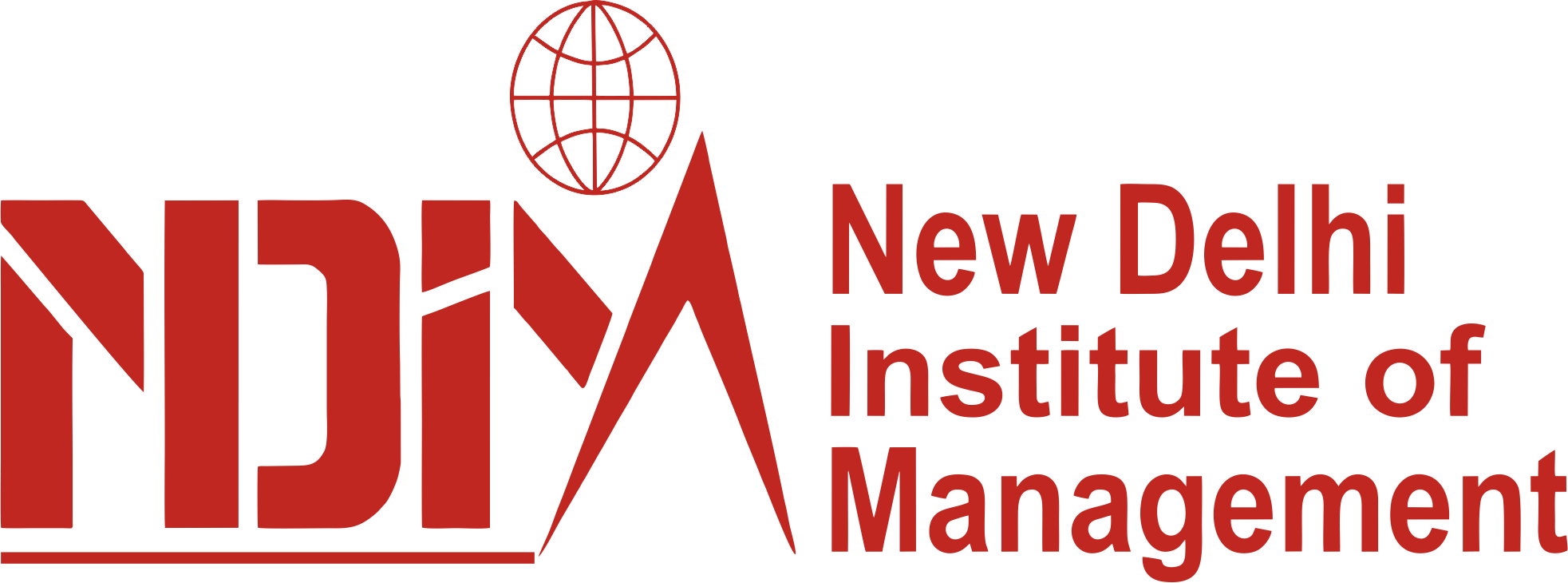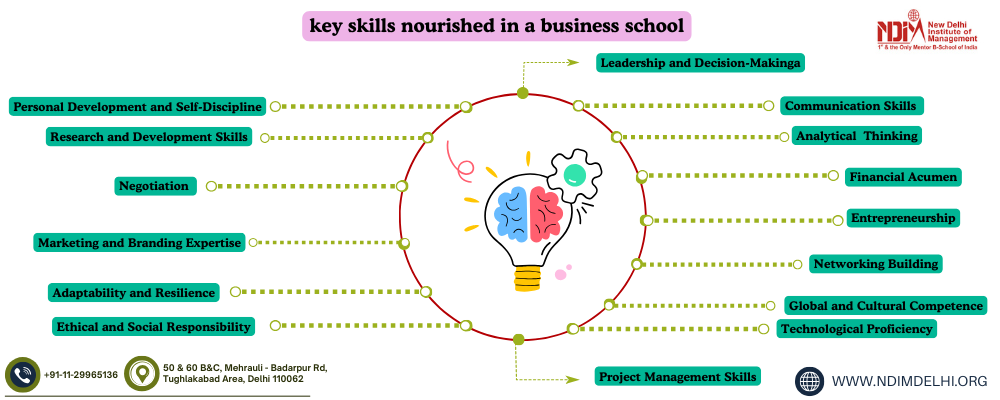Today’s business environment is constantly changing, and MBA programs are designed to equip students with an array of abilities that allow them to succeed as executive managers. They are focused on enhancing technological and interpersonal skills and will ensure that the graduates can handle the most difficult business problems.
These are some of the sought-after skills taught in business schools:
- Leadership and Decision-Making
Leadership is the central component of PGDM/MBA courses. PGDM/MBA programs teach students how to manage teams, resolve conflict, and encourage creativity. Through cases studies, simulations as well as real-world assignments Students learn how to:
- Influence and inspire: The ability to motivate teams toward achieving common objectives.
- Take strategic decisions using data analysis and consider: Learning possible outcomes for making informed decisions.
- Adapt to different leadership styles: Learning and applying different leadership styles to suit different organizational settings.
- Real-world application: Many PGDM programs offer leadership seminars that provide students with practical exposure to real-life scenarios. These sessions focus on developing skills such as managing challenging situations within an organization and making timely, effective decisions.
- Communication Skills for MBA Students
Communication skills are essential to succeed in the world of business. PGDM/MBA students are trained to communicate their ideas effectively and convincingly regardless of whether they are in boardrooms or public venues. Particular areas of study include:
- Public speaking: Confidence in giving effective public speaking presentations.
- Negotiation skills: The art of convincing and engaging the stakeholders.
- Active listening: Inquiring into other’s perspectives to encourage the process of collaboration.
- Real-world application: Students participate in debate groups, mock interviews, and discussion groups to improve their nonverbal and verbal communication abilities.
Application Invited for PGDM 2025 at NDIM
- Analytical and Critical Thinking
PGDM/MBA programs develop skills in data analysis, problem-solving, and critical thinking. These abilities are crucial for creating strategies, predicting outcomes, and solving real-world business challenges effectively. PGDM programs emphasize:
- Qualitative analysis: The process of interpreting financial information, statistical data, and indicators to provide relevant conclusions.
- Critical thinking: Evaluating the situation objectively, and generating new strategies.
- Problem-solving: Recognizing problems, exploring options, and then implementing strategies that work.
- Real-world application: Analysing case studies, as well as live projects with companies, enables students to tackle real-world business issues.
- Financial Acumen
The understanding of financial concepts is vital to any business professional who wants to succeed. Business schools provide comprehensive training in:
- Financial statement analysis: Understanding the balance sheets, income statements as well as statements of cash flow.
- Budgeting and forecasting: Preparing budgets as well as predicting financial outcomes.
- Investment strategies: Understanding the basics of portfolio management and risk analysis.
- Real-world application: Opportunities for internships in financial institutions or finance departments allow students to use real-life classroom lessons.
- Entrepreneurship and Innovation
In management studies, some students focus on entrepreneurship, making the development of an entrepreneurial mindset a key goal of PGDM/MBA programs. These students learn:
- Business planning: Designing business plans and strategies.
- Risk management: Learn the art of balancing risk and benefits in decision-making.
- Creativity and innovation: Encourage thinking outside the box to tackle business issues.
- Networking and Relationship Building
PGDM/MBA schools emphasize the importance of developing business relationships, where students learn to:
- Extend professional networks: Attend professional events, and meet with former students.
- Enhance emotional intelligence: Learning and managing relationships with others effectively.
- Encourage collaboration: working in different teams and creating relationships.
- Real-world application: Many B-schools hold social events for alumni and networking, allowing students to meet professionals from the industry.
- Global and Cultural Competence
Since businesses are becoming more international, a better understanding of cultural diversity is essential. Schools of business prepare students for:
- Work across cultures: Explore different cultures in multicultural environments.
- Learn about the global Markets: Study the global trends in business and economic policy.
- Adapt to global challenges: Develop strategies to address global issues including sustainability, ethics, and environmental issues.
- International exposure: Programs for Exchange as well as international study tours allow students to experience global corporate procedures.
- Technological Proficiency
Digital technology requires the ability to be proficient in technology. Business schools provide students with the following skills:
- Data analytics: Utilizing tools such as Excel, Tableau, and Python to analyze the information.
- Digital marketing: Gaining knowledge about social media platforms, tools, and web-based advertising strategies.
- Technology-savvy: Be up to date in AI, blockchain as well as other technologies that are emerging.
- Real-world application: Collaboration with technology firms and specialization courses that teach students about digital transformation. to take on roles that require technology.
- Project Management Skills
Being able to lead complex projects is an essential skill required of PGDM/MBA students. A student must be able to manage challenging projects. MBA courses concentrate on:
- Time management: A method of determining the priority of work and making sure that deadlines are adhered to.
- Resource allocation: effectively using financial, human and physical resources.
- Risk evaluation: Identification of risks that could be a risk and preparing contingency strategies.
- Real-world application: Capstone projects and internships require you to manage real-world tasks to demonstrate these capabilities.
- Ethical and Social Responsibility
Modern business models focus on sustainability and ethics. Business schools nurture:
- Corporate social responsibility: Focuses on the influence businesses have on society. It emphasizes ethical practices, sustainable growth, and community development. The goal is to create positive societal impacts while achieving business success.
- Ethics-based decisions: It strikes a balance between profit as well as a moral obligation.
- Sustainable methods: Promoting sustainable and environmentally friendly projects. socially responsible initiatives.
- Real-world application: Many MBA programs incorporate CSR initiatives and work with non-governmental organizations.
- Adaptability and Resilience
The business world is ever-evolving, requiring adaptability and resilience. Students are equipped with the skills to navigate change effectively. This prepares them to thrive in dynamic environments and tackle challenges head-on.
- Open to new opportunities: Be open and willing to take on every challenge that comes your way.
- Be aware of the stress: Build resilience even in the most extremely high-pressure situations.
- Creative thinking: It involves finding innovative solutions during crises. It focuses on transforming challenges into opportunities for growth.
- Real-world application: Simulations for Crisis Management as well as experiencing real-world situations help students prepare for the occurrence of a wide range of uncertainty.
- Marketing and Branding Expertise
Selling skills are essential to market products or services effectively. PGDM/MBA students are taught:
- Consumer behaviour analysis: Studying the components that determine the choices of consumers.
- Marketing management: The process of developing and executing strategies to meet business goals. It focuses on understanding customer needs, creating value, and building relationships. This includes market research, branding, and promotion.
- Digital strategies: Use of social media platforms to market activities. They aim to enhance brand visibility and engagement.
- Real-world application: A task that could be utilized for advertising campaigns where students can assess their skills.
- Negotiation and Conflict Resolution
Negotiating effectively and solving conflicts is a vital capability to be able to master. The business school provides students with:
- Bargaining strategies: reaching favourable agreements that are mutually profitable.
- Mediation of conflicts: Resolution of conflict between teams or within a company.
- Stakeholder management: Balance between the demands of different stakeholder groups.
- Real-world application: Simulations and role-plays with simulations of negotiation aid in preparing students for real-world situations.
- Research and Development Skills
PGDM/MBA courses encourage research-based programs, allowing students to
- Do market research: Conduct market research. Find and analyze information on current advancements in the field.
- Gain insight: to transform research findings into business strategies.
- Continue to innovate: Make use of research to stimulate your imagination.
- Real-world application: Collaboration initiatives in collaboration with academic and business institutions provide students with practical instruction.
- Personal Development and Self-Discipline
The focus will be on preparing students for continuous growth and self-improvement. Key focus areas will include building discipline, setting goals, and fostering a growth mindset, with key areas including:
- Time management: The key to completing your coursework on time lies in effectively prioritizing tasks and ensuring strict adherence to deadlines.
- Self-awareness: Recognizing weaknesses and areas for improvement.
- Goal setting: An approach to making goals specific to your professional life and accomplishing the objectives.
- Real-world application: training sessions on self-development, along with mentorship programs that guide students on their journey to personal development.
Conclusion
These aren’t just education schools; they’re innovative educational programs designed to help students excel in an ever-changing industry. By fostering a mix of interpersonal abilities technical capabilities and leadership capabilities that enable for the challenges ahead as well as take advantage of opportunities, and create significant results. If you’re a PGDM/MBA Student, these capabilities are essential to achieving successful careers. They help shape the future leaders of entrepreneurs and businesses.
At NDIM, we consider ourselves to be more than an academic institution. We recognize that the pace of change in our world. We’re constantly revising our educational curriculum to keep up with the demands of today. We don’t restrict ourselves to just changes to the curriculum. We encourage the development of abilities that improve the personality of our student’s potential and assist them in preparing for the future.
The thoughtfully planned Corporate Skills and Development (CSD) classes prove our dedication. The classes focus on developing the personality and abilities to communicate with our students. By regularly having mock tests and taking exams, along with constant assessment and constructive feedback, we strive to enhance their abilities and prepare them to meet the upcoming challenges.
We are proud of its status as the top Indian B-school that mentors. Apart from providing CSD programs, we offer the best mentorship and advice of renowned business executives with years of experience within their respective specializations. These professionals will share their expertise and knowledge in providing students with top-quality tips and guidance to ensure that graduates excel in their career pathways.
To know more check our website: https://www.ndimdelhi.org/
Business schools focus on enhancing students’ leadership abilities and decision-making processes. They provide training to help students become effective leaders capable of making strategic decisions in complex business environments.
Effective communication is crucial in business. Business schools offer courses and activities designed to improve both verbal and written communication skills, ensuring graduates can convey ideas clearly and persuasively.
Students are trained to analyze complex business scenarios and develop problem-solving strategies. This involves learning to assess situations critically and apply appropriate solutions to real-world business challenges.
Recognizing the importance of globalization, business schools incorporate international case studies and cultural studies into their programs. This prepares students to operate effectively in diverse cultural settings and understand global market dynamics.
Ethics and social responsibility are integral parts of the curriculum. Students learn about ethical decision-making and the importance of corporate social responsibility, ensuring they can lead with integrity in their professional careers.
Business schools integrate technology-focused courses and training sessions into their curricula to ensure students are adept with the latest tools and platforms essential for modern business operations. This includes areas like data analysis, digital marketing, and information systems management.
Recognizing the importance of teamwork in the corporate world, business schools emphasize collaborative projects, group assignments, and team-based learning activities. These experiences help students develop interpersonal skills and understand the dynamics of working effectively within diverse teams.
Business programs expose students to a variety of case studies, simulations, and real-world scenarios that require them to think on their feet and adapt to changing circumstances. This approach fosters resilience and the ability to remain effective in dynamic business environments.
Business schools encourage creative thinking and innovation by challenging students to develop novel solutions to complex problems. This is achieved through courses on entrepreneurship, design thinking workshops, and opportunities to work on innovative projects.



